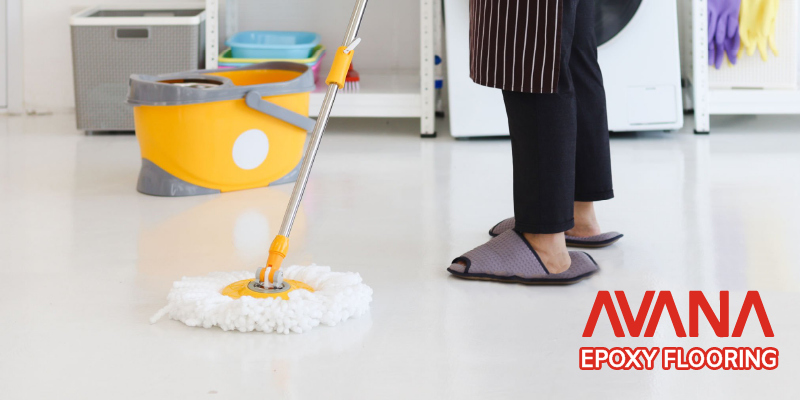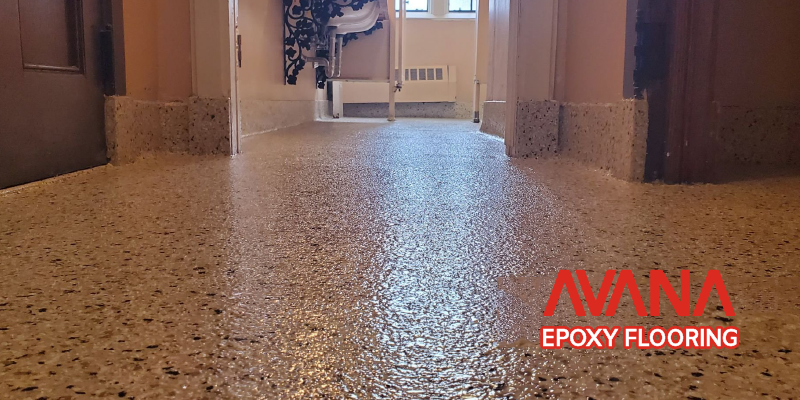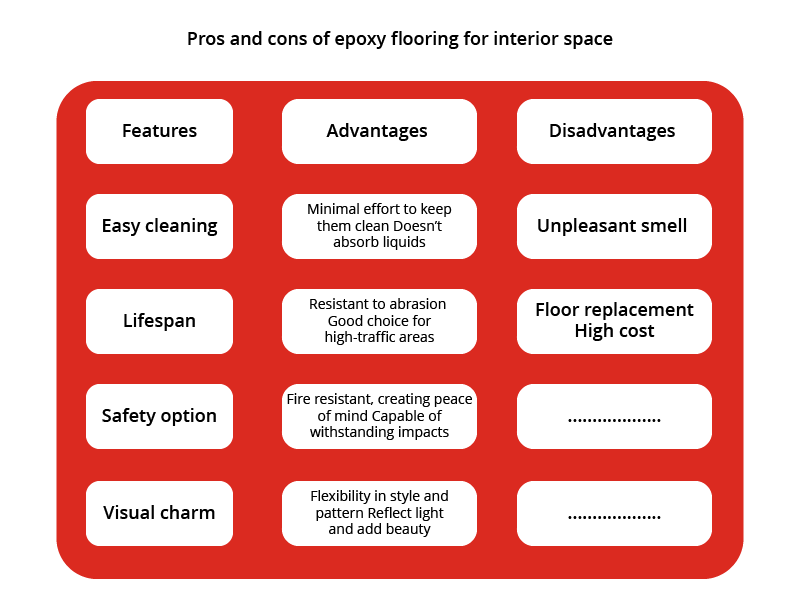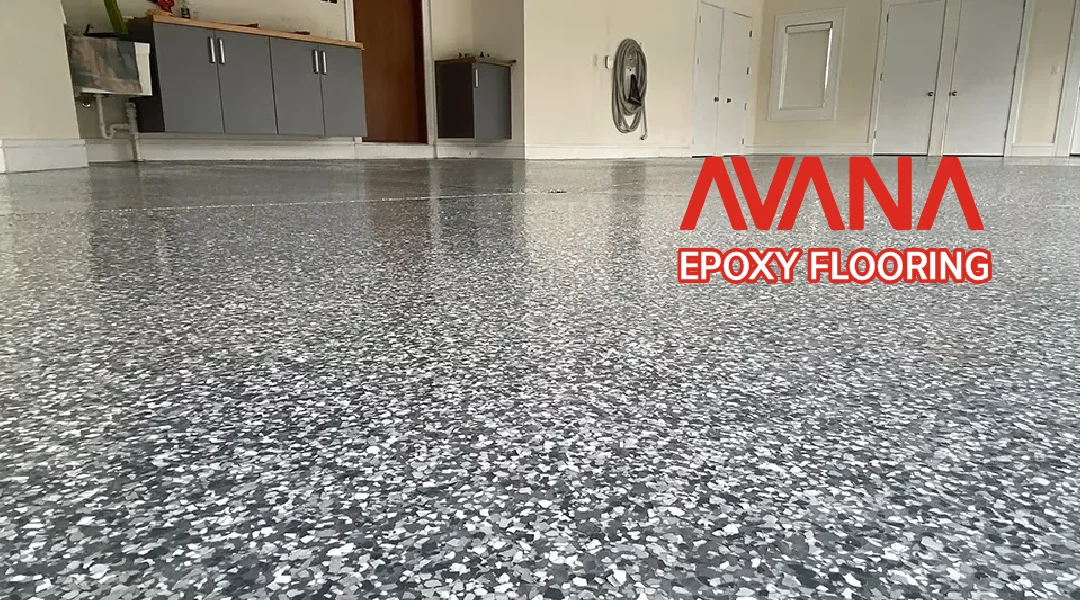What is Epoxy Flooring?
Epoxy flooring is liquid materials that are mixed with a hardener and poured onto the desired surfaces. When exposed to air, they will harden. After it hardens, this liquid forms a strong and impenetrable layer on the surface.
The very first question that pops into one’s mind is: can epoxy flooring be used indoors? Generally speaking, they are very popular among homeowners because of their top benefits. However, if the principles and safety considerations are not taken into account during the implementation of epoxy flooring, there is a possibility of difficulties in the installation and implementation of this flooring. Let’s compare its selling points and drawbacks.
Cleaning advantages of Indoor Epoxy Flooring
Minimal cleaning
Epoxy floors are easy to maintain. These floors don’t require a lot of work to keep looking good and working well. You can keep them clean and strong by sweeping or vacuuming regularly. Moreover, they are not porous, so spills and stains don’t get into them. This makes them easier to clean and less likely to have germs or smells.
Spill-resistant
The resistance of epoxy floors to stains and spills is another significant advantage. These floors do not absorb liquids, which makes them ideal for areas where spills are common. You can quickly clean up oil, grease, or chemical spills without worrying about permanent staining. But this advantage can cause problems in places like homes, especially if water or liquid spills on the surface of the epoxy. The slipperiness of epoxy increases, and this can sometimes become dangerous. For this reason, it is better to use this flooring only as an anti-slip type in high-traffic areas.

Lifespan of Epoxy
One of the most important thing about epoxy flooring is that it has a long lifespan and it is easy to apply and implement. But the key factor is that you should be picky about choosing application specialist to have a durable epoxy coating. Its exceptional adhesion ensures that it adheres to any surface and is not easily removed if it is applied properly. As a result, this makes it a popular choice for both homes and businesses.
Wear resistance
Whether it is foot traffic in business locations or mechanical traffic in industrial settings, epoxy flooring shows remarkable durability. People might ask; can epoxy flooring be used indoors? Absolutely yes since they are capable of resisting scuffs, scratches, and rubbing. Thus, this fact makes them a reliable choice for environments that require flooring solutions that can withstand intensive use.
Comparison with traditional flooring
This flooring lasts longer than regular flooring, such as vinyl or laminate. It can last for a long time without showing signs of wear, making them a wise investment for both households and businesses. So when one asks can epoxy flooring be used indoors? Or is it a better choice compared to the traditional flooring?The answer is definitely yes.
Visual charm & Aesthetic Enhancement
Epoxy flooring is not only popular for its durability and easy maintenance but also for its outstanding beauty, which enhances the interior design of your home.
Glossy Finish
Epoxy floors’ reflection adds special beauty to one’s home.This reflection can brighten up any room, making it appear more spacious and welcoming. The clear coat finish not only makes your floors look polished, but also makes your interior brighter, which could help you save energy.
Flexibility in pattern and style
Epoxy flooring can create unique patterns and effects that reflect your personal style or brand identity. You can make anything you want, from simple shapes to complicated 3D effects. The options are endless. By choosing epoxy for your floors, you’re not just selecting a flooring solution; you’re choosing a design element that can make your space look great.

Disadvantages of Indoor Epoxy Coating
Like every other product, epoxy floors have their own drawbacks, too. Therefore, it is important to know, can Epoxy flooring be used indoors? Does it have any drawbacks? Let’s consider the primary drawbacks of epoxy flooring in residential areas.
Raw Materials Unpleasant Smell
Epoxy floor raw materials are special chemicals that are combined together to form a special epoxy liquid. One of the problems with these materials is their unpleasant smell, the intensity of which varies depending on the type of material and the amount used in the composition. Naturally, using a large amount of chemicals in a closed space creates a more and more intense unpleasant smell, while if these substances are used in a well-ventilated space; the spread of the smell in the space is prevented.
Floor Replacement
As previously mentioned, epoxy flooring possesses exceptional resistance. This issue is generally regarded as an advantage; however, in the event of changing the flooring, epoxy floors may pose challenges. The least expensive way to replace this flooring is to cover it with new flooring. Otherwise, you have to spend a lot of money and time to remove the epoxy layers and prepare the ground for use with the new flooring.
Final Consideration
In this article, we had a detailed look at the question, can epoxy flooring be used indoors? Like the benefits of epoxy flooring, including its durability, ease of maintenance, and safety features. However, it’s important to consider the minor drawbacks of this flooring when choosing it for your home. As we finish, it becomes clear that using epoxy flooring indoors is both practical and beautiful. It provides a lasting solution that combines both form and function.

FAQ
Is epoxy flooring a good choice for interior spaces?
Yes, absolutely. Since they are strong and have glossy finish. Therefore, adding beauty and value to your house. Additionally they’re easy to clean, so less effort is needed.
How long does epoxy last?
They have a long lifespan of 20 to 30 years.
How safe is it to use epoxy in indoor places?
They’re very safe, especially in industrial and factory settings where harmful chemicals are kept.
Does it have any drawbacks when used indoors?
Yes, when they are placed in an enclosed area, they’ll have an unpleasant smell. Moreover, the process of changing them is so costly.

